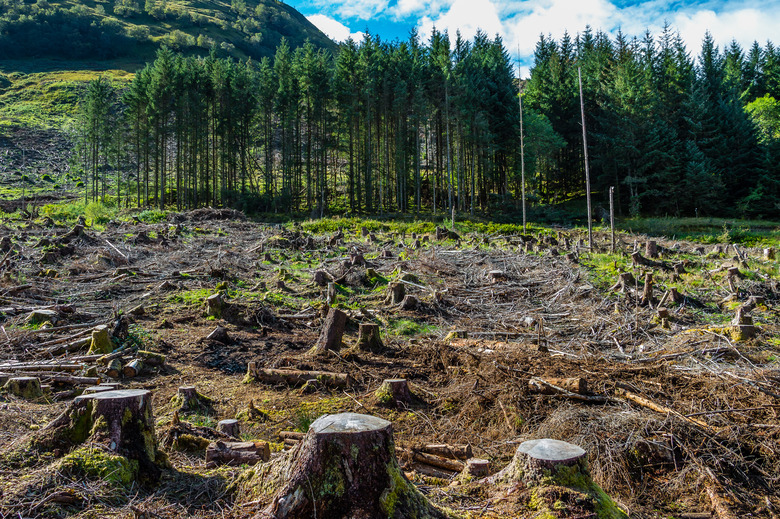How Does Deforestation Affect The Air?
Each year, 46 to 58 million square miles of forest are lost due to deforestation — the removal of trees from the land by man-made and natural events. Deforestation is caused by land-clearing for urban development and agriculture, tree harvest for wood products, and forest fires. The loss of trees has an adverse affect on the air.
TL;DR (Too Long; Didn't Read)
Deforestation has an adverse affect on air by reducing the amount of oxygen and increasing the amount of carbon dioxide as well as contributing to global warming.
Fewer Trees to "Clean" the Air
Fewer Trees to "Clean" the Air
Trees and plants, in general, produce energy for growth using a process known as photosynthesis. Using light, water and carbon dioxide, a plant produces energy in the form of sugar and releases oxygen into the air. Forests cover approximately 30 percent of the land on earth and sustain nearly 80 percent of the world's terrestrial organisms. It is estimated that one acre of trees in urban forests can produce enough oxygen for eight people and remove 188 pounds of carbon dioxide from the air.
Less Oxygen Produced
Less Oxygen Produced
Oxygen comprises only about 21 percent of air's chemical component. Yet, it is extremely important to life on earth. Living organisms, from single-celled animals to humans, use oxygen to produce the energy required to sustain them. Since trees are larger plants, their production of oxygen is significant. It is estimated that tropical rainforests, produce 40 percent of the earth's oxygen even though they cover only about 6 percent of the land. Rainforests in the Amazon have declined by 17 percent in the last 50 years as a result of deforestation.
Less Carbon Dioxide Is Removed
Less Carbon Dioxide Is Removed
Carbon dioxide is one of the greenhouse gases that help to hold heat in the atmosphere. Trees remove some of this carbon dioxide from the air through photosynthesis and store that carbon in their tissues and in the soil. This process is known as carbon sequestration. Since the industrial revolution began in the mid-1700s, more greenhouse gases have been released than removed from the air. In 2011, forests in the United States removed only about 14 percent of the carbon dioxide emitted into the air. Deforestation reduces the removal component of this cycle, further increasing the carbon dioxide in the air. This results in an increase in temperature, an effect known as global warming.
Temperatures Are Rising
Temperatures Are Rising
Not only does deforestation contribute to global warming by increasing the amount of carbon dioxide in the air but it also directly increases the temperature radiating from the land. The forest canopy shades the ground, absorbs the sun's rays for photosynthesis, and reflects about 12 to 15 percent, cooling the land beneath. This holds moisture in the soil that carries nutrients through the roots into the plant. Plants then release water vapor into the air through their leaves in a process known as transpiration. A single leaf can release more water into the air than its own weight. Water vapor in the air accumulates and falls as rain, cooling the land and carrying nutrients back to the plants. Without forests, the land would radiate and reflect heat back into the air, adding to global warming. It is estimated that trees in tropical rainforests lower the temperature by 3.6 to 6.3 degrees Fahrenheit. In the past century, the average temperature around the world has increased by 1.4 degrees Fahrenheit.
References
Cite This Article
MLA
Curley, Jeri. "How Does Deforestation Affect The Air?" sciencing.com, https://www.sciencing.com/deforestation-affect-air-10632/. 16 May 2018.
APA
Curley, Jeri. (2018, May 16). How Does Deforestation Affect The Air?. sciencing.com. Retrieved from https://www.sciencing.com/deforestation-affect-air-10632/
Chicago
Curley, Jeri. How Does Deforestation Affect The Air? last modified March 24, 2022. https://www.sciencing.com/deforestation-affect-air-10632/
